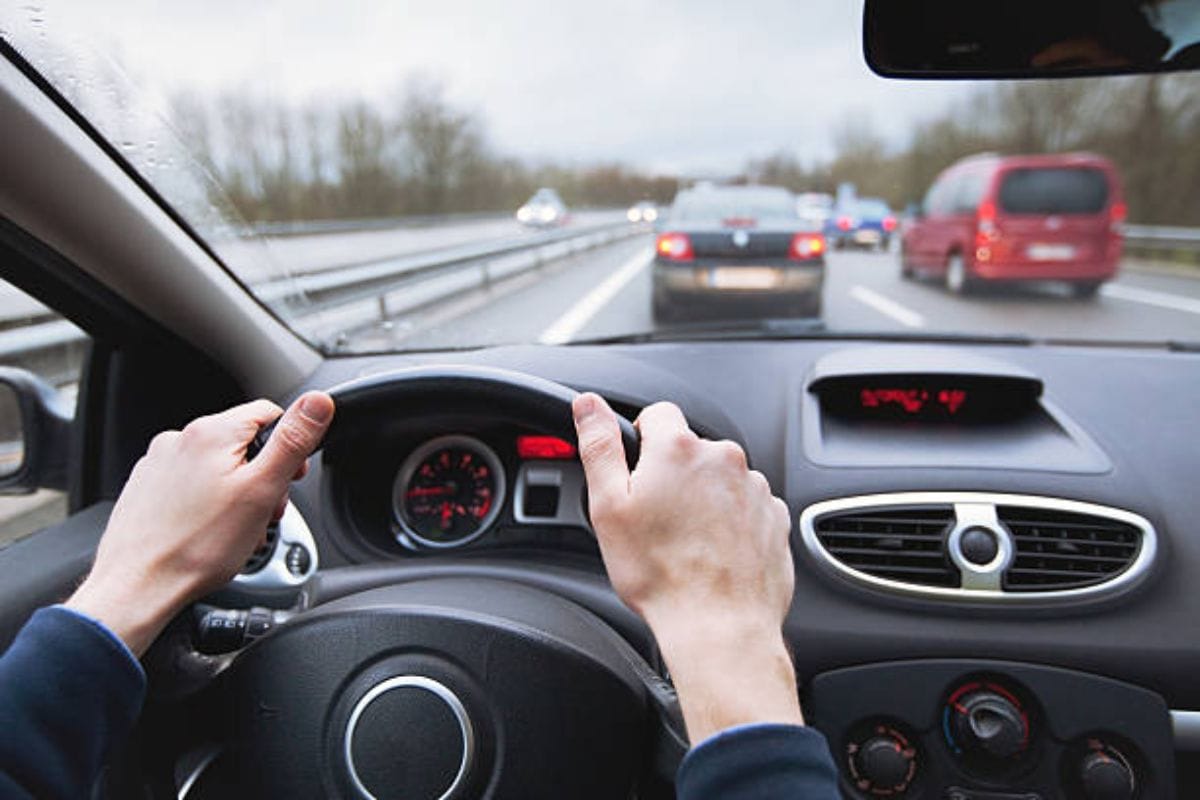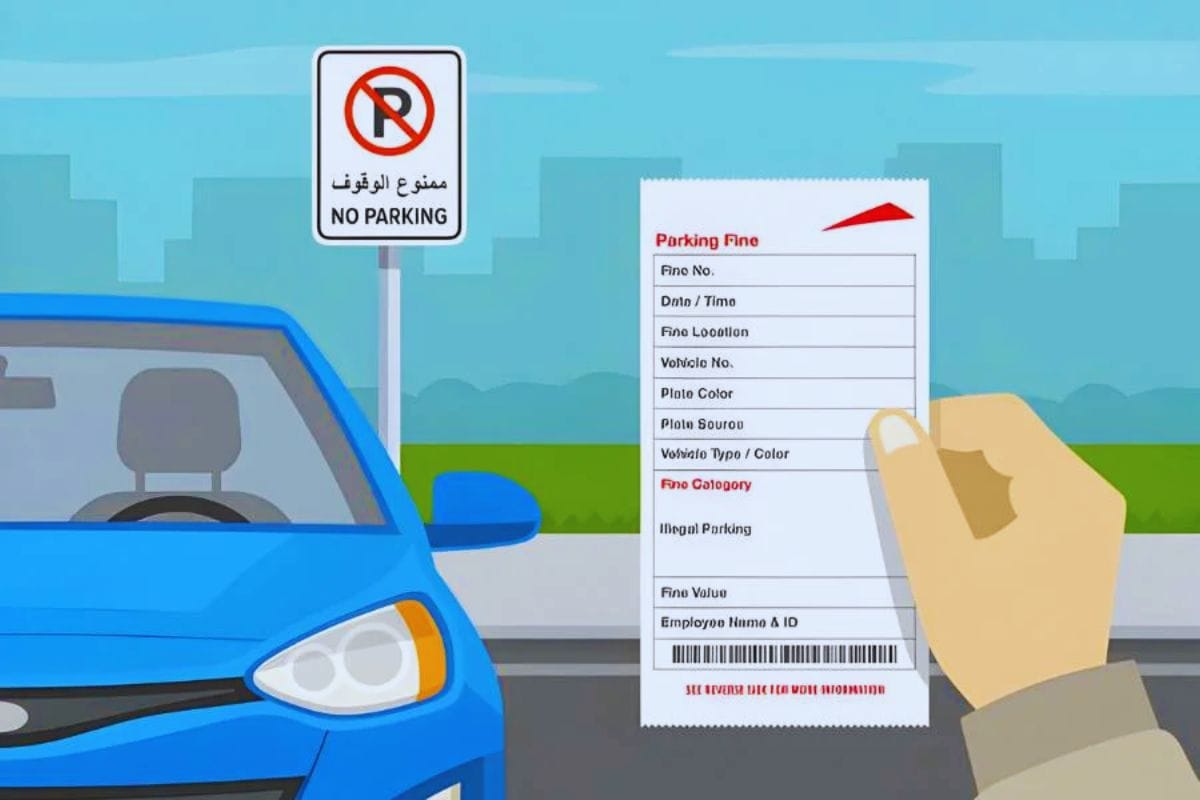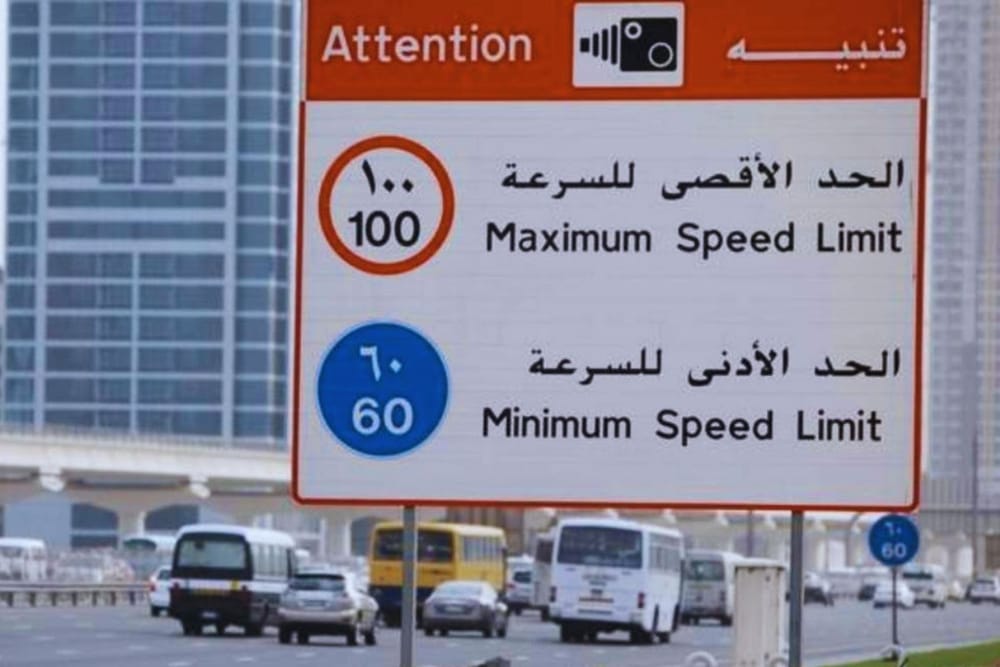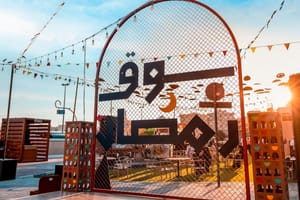Speed limits in the UAE are carefully set to promote road safety and smooth traffic flow. Both maximum and minimum speed limits apply to ensure drivers maintain safe speeds, reducing the risk of accidents caused by either excessive or slow driving. Speed limits vary based on road type, location, and occasionally in response to weather conditions. Advanced traffic radars across the UAE monitor compliance, while electronic message boards provide real-time updates to drivers on any temporary changes.
This guide covers all you need to know about speed limits in the UAE, including maximum and minimum limits for various roads, specific regulations in different emirates, and fines associated with speed limit violations.
General Speed Limits for Different Types of Roads and Vehicles in the UAE
| Vehicle Type | Road/Area | Speed Limit | Details |
|---|---|---|---|
| Light Vehicles | Parking Areas & Service Roads | 25 km/h | Lower speed for pedestrian safety in areas with heavy foot traffic. |
| Urban Single Carriageway | 40 – 60 km/h | Controlled speeds on city roads with a single lane per direction. | |
| Urban Dual Carriageway | 60 – 80 km/h | Increased limit due to separate lanes for each direction. | |
| Rural Roads | 80 – 160 km/h | Open highways permit higher speeds; varies by location and emirate. | |
| Residential Areas | 25 – 40 km/h | Reduced limits to prioritize safety in neighborhoods. | |
| Freeways/Highways | 60 – 120 km/h (up to 160 km/h in parts of Abu Dhabi) | Major highways with high limits; Abu Dhabi highways permit up to 160 km/h. |
| Vehicle Type | Road/Area | Speed Limit | Details |
|---|---|---|---|
| Heavy Vehicles | Parking Areas & Service Roads | 25 km/h | Restriction ensures pedestrian safety in areas with frequent foot traffic. |
| Highways (Trucks & Heavy Goods) | 80 km/h | Maximum speed allowed for trucks and heavy goods vehicles on highways. | |
| Highways (Buses & Minibuses) | Up to 100 km/h | Slightly higher limit for buses and minibuses carrying passengers. | |
| Freeways/Highways | 60 – 80 km/h | Heavy vehicles restricted to these speeds even on major high-speed roads. |
How Does the Speed Buffer and Maximum Speed Limit System Work in the UAE?
In the UAE, a speed buffer of 20 km/h is applied in most emirates, allowing motorists to exceed the posted speed limit by up to 20 km/h without incurring fines. For example, if the speed limit is 120 km/h, drivers are only penalized if they exceed 140 km/h. This buffer is intended to account for slight speed variations and ease the enforcement process on UAE roads. However, Abu Dhabi does not have this buffer, meaning that drivers exceeding the posted speed limit by even 1 km/h will receive a fine.
Speed Limit vs. Maximum Speed Limit
It’s essential to distinguish between a posted speed limit and the maximum speed limit in most emirates. The speed limit refers to the number displayed on round, red-bordered signs, indicating the general driving limit. In emirates outside Abu Dhabi, this limit has an additional 20 km/h buffer, creating a maximum speed limit. For example, a speed limit of 80 km/h in Dubai would allow drivers up to 100 km/h due to the buffer, and the actual enforceable maximum limit is indicated on large rectangular signs.
In Abu Dhabi, the posted speed is strictly the enforceable maximum limit with no added buffer, and exceeding this limit triggers radar fines. Drivers should avoid assuming that an additional 20 km/h buffer applies beyond the displayed maximum speed, as going over it will activate radar cameras in both Abu Dhabi and other emirates. This system ensures that drivers maintain consistent awareness of posted limits, promoting safer driving practices across the UAE.
Speed Limits on Major Roads and Streets in Dubai
Below is a comprehensive table detailing the speed limits across various major roads and streets in Dubai, along with the corresponding lane numbers. Adhering to these limits ensures a safer driving experience and helps avoid traffic fines.
| Road/Street | Speed Limit (km/h) | Number of Lanes |
|---|---|---|
| Al Nahda | 80 | 4/3 |
| Damascus | 80 | 3 |
| Al Quds | 80 | 4 |
| Tunisia | 80 | 3 |
| Sheikh Khalifa | 70 | 3 |
| Amman | 80/60 | 3/2 |
| Al Minaa | 80 | 4/3 |
| Beirut | 80 | 4/3 |
| Zaabeel Second | 80 | 2/3 |
| Sheikh Zayed bin Hamdan Al Nahyan | 100/90 | 2/3 |
| Airport Tunnel-Beirut | 80 | 4 |
| Tripoli | 100/90 | 3/2 |
| Al Jumeira | 70 | 2 |
| Nad Al Shiba | 70 | 2 |
| Al Wasl | 70 | 3/2 |
| Baghdad | 80/70 | 3/2 |
| Um A Sheef | 70 | 2 |
| Al Manarah | 70 | 2 |
| Al Athar | 70 | 2 |
| Al Thunaya | 70 | 2 |
| Al Hadeeqa | 70 | 3/2 |
| Al Seif | 70 | 3/2 |
| Al Orouba | 70 | 3/2 |
| Towers | 70 | 3/2 |
| Muscat | 80 | 3/2 |
| Al Khail | 100 | 5 |
| Al Yalayes | 120/100 | 2 |
| Al Aweer | 100 | 2 |
| Emirates | 110 | 6 |
| Mohammad Bin Zayed | 110 | 2 |
| Expo | 100 | 7/6 |
| Al Ittihad | 100 | 4/3 |
| Ras Al Khor | 100 | 5/4 |
| Sheikh Zayed | 120/100 | 4/3 |
| Al Rabat | 100 | 6 |
| Al Khawaneej | 100 | 5/4 |
| Al Amardi | 90 | 4/3 |
| Sheikh Rashid | 100 | 3/2 |
| Hatta Main | 100/80 | 6/5 |
| Al Khaleej | 80 | 4/3 |
| Airport | 80 | 4/3 |
| Nad Al Hamar | 80 | 5/3 |
| King Salman Bin Abdulaziz | 70 | 3 |
| Al Soufouh 2 | 70 | 2 |
| Oud Metha | 80/60 | 4/3 |
| Um Hurair | 80 | 3 |
| Um Suqaim | 90 | 4/3 |
| Al Mankhoul | 80 | 2 |
| Al Manama | 80 | 3/2 |
| Al Maidan | 100/80 | 4/3 |
| Casablanca | 70 | 4/3 |
| Hessa | 100/80 | 5/4 |
| Al Mafraq | 70 | 3/2 |
| Dubai Financial | 80 | 5/4 |
| Al Qudra | 100 | 2 |
| Algeria | 80 | 3/2 |
| Tunisia | 80 | 3/2 |
| Dubai-Al Ain | 120/100 | 4/3 |
| Al Asayel | 80/70 | 3 |
| Qarn Al Sabkhah | 80 | 3 |
| Jumeira Palm | 60 | 2 |
| Seeh Shuaib | 80 | 3 |
Speed Limits on Major Roads and Streets in Abu Dhabi?
| Road/Street | Maximum Speed Limit (km/h) | Minimum Speed Limit (km/h) | Notes |
|---|---|---|---|
| Abu Dhabi-Al Ain Highway | 160 | — | One of the highest speed limits, reaching up to 160 km/h. |
| Sheikh Khalifa Highway | 160 | — | Maintains a high-speed limit for efficient travel. |
| Sweihan Road | 120 | — | Reduced from 140 km/h by Abu Dhabi Police for safety reasons. |
| Sheikh Mohammed Bin Rashid Road | 140 | 120 | 120 km/h minimum applies on left lanes; AED 400 fine for violation. |
| Sheikh Zayed Bin Sultan Street | 100 | — | Temporarily reduced to 100 km/h until further notice. |
In Abu Dhabi, there is no 20 km/h buffer as found in other emirates. Drivers exceeding the posted speed limit, even by 1 km/h, will receive a fine, making strict adherence to these limits crucial.
UAE Traffic Fines for Speeding Violations
| Violation | Fine (AED) | Black Points | Vehicle Impoundment | Additional Details |
|---|---|---|---|---|
| Speeding up to 20 km/h over the limit | 300 | 0 | None | Standard fine for minor speeding. |
| Speeding 30 km/h over the limit | 600 | 0 | None | Increased fine due to higher speeding risk. |
| Speeding 40 km/h over the limit | 700 | 0 | None | Fine reflects moderate risk level. |
| Speeding 50 km/h over the limit | 1,000 | 0 | None | High-risk category with a substantial fine. |
| Speeding 60 km/h over the limit | 1,500 | 6 | 15 days for light vehicles | Significant offense with fines, black points, and vehicle impounding. |
| Speeding above 60 km/h but less than 80 km/h | 2,000 | 12 | 30 days for light vehicles | Severe violation; heavy penalty due to danger posed. |
| Speeding above 80 km/h | 3,000 | 23 | 60 days for light vehicles | Extreme speeding offense, highest penalty with maximum points and impounding. |
| Failure to give way in the fast lane | 400 | 0 | None | Applies to motorists not yielding in the left (fast) lane. |
| Minimum speed limit violation on Sheikh Mohammed Bin Rashid Road | 400 | 0 | None | Fine for driving under 120 km/h on specific sections in Abu Dhabi. |
| Exceeding speed limit by 1 km/h in Abu Dhabi | Varies | Varies | Varies | No 20 km/h buffer; any excess over posted limit incurs a fine. |
As the country expands its infrastructure and embraces innovation, these carefully set speed limits and fines underscore a broader vision of orderly, safe, and reliable travel. Understanding and respecting speed limits is more than just avoiding fines; it’s about contributing to a culture of mindful driving that values the safety of all road users.
With advanced monitoring systems, proactive road safety campaigns, and real-time updates, the UAE sets a high standard for responsible driving, urging each driver to be mindful, informed, and compliant on the road.
Frequently Asked Questions (FAQs)
Q. Is there a grace period for renewing my license if I have fines for speeding violations?
A. No, all outstanding fines must be cleared before you can renew your license in the UAE. The Roads and Transport Authority (RTA) and police portals allow online payment, making it easy to settle fines promptly.
Q. Do speed limits change in the UAE based on weather conditions?
A. Yes, during adverse weather like heavy rain or fog, authorities may reduce speed limits temporarily for safety. These changes are often displayed on electronic message boards along major roads and highways.
Q. Are speed limits different for certain times of the day, such as night hours?
A. Typically, speed limits remain the same day and night. However, in case of any special events or road maintenance, temporary limits may be applied.
Q. How do I know the exact speed limit on a road, especially with varying limits?
A. Speed limits are clearly displayed on circular white signs with a red border, while electronic boards show any temporary speed adjustments. In most Emirates, you’ll also see the maximum speed with a 20 km/h buffer on larger rectangular signs.
Q. If I’m driving a rental car, am I responsible for any speeding fines?
A. Yes, fines incurred while driving a rental car are the responsibility of the driver. Most rental companies will charge the fine to your account directly or hold you liable as per the rental agreement.
Q. What happens if I exceed the minimum speed limit on certain roads in Abu Dhabi?
A. Driving below the minimum speed, especially in left lanes on roads like Sheikh Mohammed Bin Rashid Road, results in a fine of AED 400. This rule ensures traffic flow on high-speed roads and prevents congestion.
Q. Does the speed buffer apply to all roads in Emirates other than Abu Dhabi?
A. Generally, the 20 km/h buffer applies on most roads in Emirates other than Abu Dhabi. However, some specific roads or zones, such as school zones, may have stricter rules with no buffer.
Q. How will I know if I have received a speeding fine?
A. Speeding fines are typically notified via SMS to the registered number on your vehicle registration. You can also check for any fines on the RTA app or the police website for each Emirate.
Also read:














